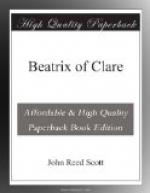The monks groaned aloud; but the Abbot only shrugged his shoulders.
“You have heard,” De Lacy went on with steady menace; “and do not think it is an idle boast. Answer! have you the Countess of Clare within the bounds of Kirkstall Abbey?”
Aldam raised his hand in seeming horror. “Think you that the monks of Benedict------?” he began.
“Answer!” cried Aymer, striking the arm of the Prior’s chair with his mailed fist so fiercely that its stout occupant, in sudden terror, fled to the rear of the dais.
Instantly the Abbot seated himself in the vacant place.
“I frighten not so easily as the timid Brother James,” he said. “But as the lady is not with us, you are welcome to that knowledge.”
“Where is she, then?”
The Cistercian leaned back and stared De Lacy in the face. “If I knew I would not tell you.”
“You do know—and either you tell or you hang from your own gate beam.”
Aldam half arose from his chair; then dropped back and laughed.
“You would not dare,” he said; “and were I the abductor himself.”
De Lacy faced toward the door.
“What ho! Without!” he called.
A score of men-at-arms burst into the room with drawn swords. The monks set up a fresh cry of terror and fell to chanting prayers, and Father Alfred and the Chancellor sought refuge in the shadow with the Prior. But the Abbot never stirred in his seat, save to shift his gaze to the fresh disturbers of his authority.
At a sign from De Lacy, the soldiers sheathed their weapons and fell into double rank near the door, while Raynor Royk advanced to the dais and saluted. Then the Knight turned again to the Abbot.
“We shall search this Abbey from loft to cellar,"’ he said. “If the Countess be not here and you still remain obdurate, then shall you stretch halter, an you were the Pope of Rome himself. . . Raynor, we commit these good fathers to your custody. Let none quit the room—if need be, cut down any who attempt it.”
All this time Sir John de Bury was leaning on his long sword, his cold grey eyes fixed on the Abbot. Now he faced about and, silent still, tramped out of the Chapter-house beside De Lacy. And with them went half of the men-at-arms.
XXIII
THREE CHEVRONS GULES
When the Knights had gone Raynor Royk, having posted guards at the three doors, turned the broken chair over with his foot and sitting down on one of the fragments so that he could observe the entire room, fell to polishing his dagger.
The Abbot watched him furtively for a space, then arose.
“Are you of De Lacy’s or De Bury’s household?” he asked with condescending friendliness.
No answer.
“You hear? I asked if De Bury or De Lacy were your master.”
No answer; and the polishing went vigorously on.




